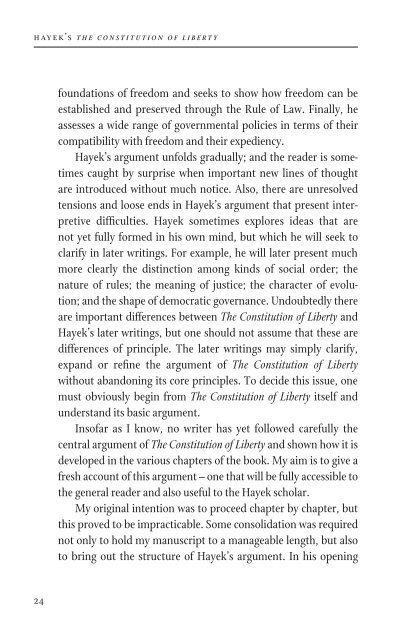Hayek's The Constitution of Liberty - Institute of Economic Affairs
Hayek's The Constitution of Liberty - Institute of Economic Affairs
Hayek's The Constitution of Liberty - Institute of Economic Affairs
Create successful ePaper yourself
Turn your PDF publications into a flip-book with our unique Google optimized e-Paper software.
h ay e k ’ s t h e c o n s t i t u t i o n o f l i b e r t y<br />
a u t h o r ’ s p r e f a c e<br />
foundations <strong>of</strong> freedom and seeks to show how freedom can be<br />
established and preserved through the Rule <strong>of</strong> Law. Finally, he<br />
assesses a wide range <strong>of</strong> governmental policies in terms <strong>of</strong> their<br />
compatibility with freedom and their expediency.<br />
Hayek’s argument unfolds gradually; and the reader is sometimes<br />
caught by surprise when important new lines <strong>of</strong> thought<br />
are introduced without much notice. Also, there are unresolved<br />
tensions and loose ends in Hayek’s argument that present interpretive<br />
difficulties. Hayek sometimes explores ideas that are<br />
not yet fully formed in his own mind, but which he will seek to<br />
clarify in later writings. For example, he will later present much<br />
more clearly the distinction among kinds <strong>of</strong> social order; the<br />
nature <strong>of</strong> rules; the meaning <strong>of</strong> justice; the character <strong>of</strong> evolution;<br />
and the shape <strong>of</strong> democratic governance. Undoubtedly there<br />
are import ant differences between <strong>The</strong> <strong>Constitution</strong> <strong>of</strong> <strong>Liberty</strong> and<br />
Hayek’s later writings, but one should not assume that these are<br />
differences <strong>of</strong> principle. <strong>The</strong> later writings may simply clarify,<br />
expand or refine the argument <strong>of</strong> <strong>The</strong> <strong>Constitution</strong> <strong>of</strong> <strong>Liberty</strong><br />
without abandoning its core principles. To decide this issue, one<br />
must obviously begin from <strong>The</strong> <strong>Constitution</strong> <strong>of</strong> <strong>Liberty</strong> itself and<br />
understand its basic argument.<br />
Ins<strong>of</strong>ar as I know, no writer has yet followed carefully the<br />
central argument <strong>of</strong> <strong>The</strong> <strong>Constitution</strong> <strong>of</strong> <strong>Liberty</strong> and shown how it is<br />
developed in the various chapters <strong>of</strong> the book. My aim is to give a<br />
fresh account <strong>of</strong> this argument – one that will be fully accessible to<br />
the general reader and also useful to the Hayek scholar.<br />
My original intention was to proceed chapter by chapter, but<br />
this proved to be impracticable. Some consolidation was required<br />
not only to hold my manuscript to a manageable length, but also<br />
to bring out the structure <strong>of</strong> Hayek’s argument. In his opening<br />
chapters, Hayek interweaves observations about freedom with<br />
observations about knowledge. I treat freedom and knowledge<br />
thematically, in different sections, but with a view to their connection.<br />
Hayek takes up the problem <strong>of</strong> inequality at several points in<br />
his book, but I consolidate much <strong>of</strong> this in discussing Chapter 6.<br />
I consolidate several chapters in Part II on the origin and growth<br />
<strong>of</strong> the Rule <strong>of</strong> Law; and in covering what Hayek says in Part III on<br />
issues <strong>of</strong> policy, I look for common themes. To see how the order<br />
<strong>of</strong> my exposition compares with Hayek’s, the reader will find it<br />
helpful to refer to Hayek’s own table <strong>of</strong> contents, which can be<br />
found at the end <strong>of</strong> the book. 1<br />
<strong>The</strong> interpretive literature on Hayek is voluminous, and much<br />
<strong>of</strong> it is quite valuable; but if I should attempt to address it, a quite<br />
different book from the one intended would surely emerge. Thus<br />
I stick closely to the text <strong>of</strong> <strong>The</strong> <strong>Constitution</strong> <strong>of</strong> <strong>Liberty</strong> and to some<br />
related works by Hayek. Modern search engines, along with<br />
printed bibliographies, make it fairly easy to identify and <strong>of</strong>ten<br />
access the pertinent secondary literature on Hayek. For convenience<br />
I follow Hayek’s practice <strong>of</strong> referring to humanity as ‘man’<br />
and to the individual as ‘he,’ rather than switching to genderneutral<br />
terminology.<br />
I owe a debt <strong>of</strong> gratitude to many persons as well as to several<br />
institutions. I am grateful first <strong>of</strong> all to Hayek, who was one <strong>of</strong><br />
my teachers in the University <strong>of</strong> Chicago’s Committee on Social<br />
Thought. He also chaired my dissertation committee, whose<br />
other members were Leo Strauss and Joseph Cropsey. I first met<br />
Hayek at about the time that he was preparing <strong>The</strong> <strong>Constitution</strong><br />
<strong>of</strong> <strong>Liberty</strong> for publication. Through the years I have received vital<br />
1 This is not available in the online version.<br />
24<br />
25












